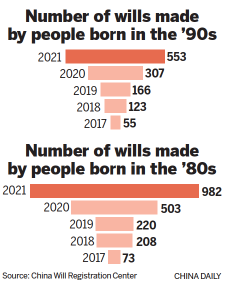March 25, 2022
BEIJING – Early arrangement shows more rational views on life and death, center says
More young people have been preparing wills, and they’re including a number of digital assets that previous generations wouldn’t have considered.
According to a white paper released recently by the China Will Registration Center, more than 1,200 people born in the ’90s have registered wills with the center, with 553 doing so last year, 80 percent more than in 2020.
More than 220 people born this century, the oldest of whom would only be in their early 20s, have also registered wills at the center.
Most of the assets set out in young people’s wills are bank deposits, Alipay and WeChat Pay balances and accounts for virtual or online games.
The center said 71.6 percent of those born in the ’90s included real estate in their wills, but many of the properties were purchased by parents under their children’s names.
For those born in the ’80s, their main assets were also real estate and bank savings, however 13.1 percent of their wills involved company equity and 14.1 percent involved securities funds.
Chen Kai, director of the center’s management committee, said those born in the ’80s are faced with aging parents and young children with multifaceted interests, pushing them to think about making wills early.
The paper said there are many reasons for young people to make a will. The survey found that many young people believe accidents can happen at any time and it would be a shame to leave this world without input about what happens to their possessions.
According to the center, a 17-year-old made a will early last year. He told the center’s workers that he had helped a hospital in the fight against the COVID-19 pandemic and witnessed a number of critically ill patients. That experience made him realize the future is unpredictable and he wanted to leave all his savings to his mother.
Chen said such cases show that people are deciding to make a will at a younger age and people’s ideas about making a will are also changing, as a different attitude toward life and death shows that people are becoming more rational when they review their past and plan their future in the process of making a will.
The paper also showed that the number of wills made by people seeking a divorce increased in the year after the country adopted a 30-day cooling-off period for divorcing couples. Chen said after the cooling-off period took effect, many divorcing couples discovered that if an accident occurred, their properties would be legally inherited by their partners during the period, so a lot of them chose to plan a will.

CHINA DAILY


